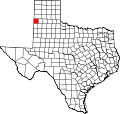Friona, Texas | |
|---|---|
 Friona at dusk | |
| Motto: "The Biggest Small Town in Texas" | |
 Location of Friona, Texas | |
 | |
| Coordinates: 34°38′20″N102°43′18″W / 34.63889°N 102.72167°W | |
| Country | United States |
| State | Texas |
| County | Parmer |
| Government | |
| • Type | Council-manager |
| • City Manager | Leander Davila |
| Area | |
• Total | 1.40 sq mi (3.63 km2) |
| • Land | 1.40 sq mi (3.63 km2) |
| • Water | 0 sq mi (0.00 km2) |
| Elevation | 4,019 ft (1,225 m) |
| Population | |
• Total | 4,171 |
| • Density | 2,979.3/sq mi (1,150.31/km2) |
| Time zone | UTC-6 (Central (CST)) |
| • Summer (DST) | UTC-5 (CDT) |
| ZIP code | 79035 |
| Area code | 806 |
| FIPS code | 48-27660 [3] |
| GNIS feature ID | 1357767 [4] |
| Website | www |
Friona is a city in Parmer County, Texas, United States. The population was 4,171 at the 2020 census. [2] Friona was established as a small community in 1898 by XIT Ranch, originally called Frio, which is also the word for "cold" in Spanish.
Contents
The community served as a shipping point for the Pecos and Northern Texas Railroads. In 1906, the George G. Wright Land CO. chose the community for a colonization project, promising settlers of fertile soil, and a healthful climate. The community then became known as Friona after the opening of a post office in March 16, 1907 and started to construct various buildings, which were a hotel, livery stable and a bank. Soon after, the first church in Friona was constructed, and then in the following year of 1908 a school. [5]
In 2007, the Texas State Legislature declared Friona the "Cheeseburger Capital of Texas". The city began holding the "Cheeseburger Cook-Off and Festival" in 2006.
The city motto is "The Biggest Small Town in Texas".[ citation needed ]
